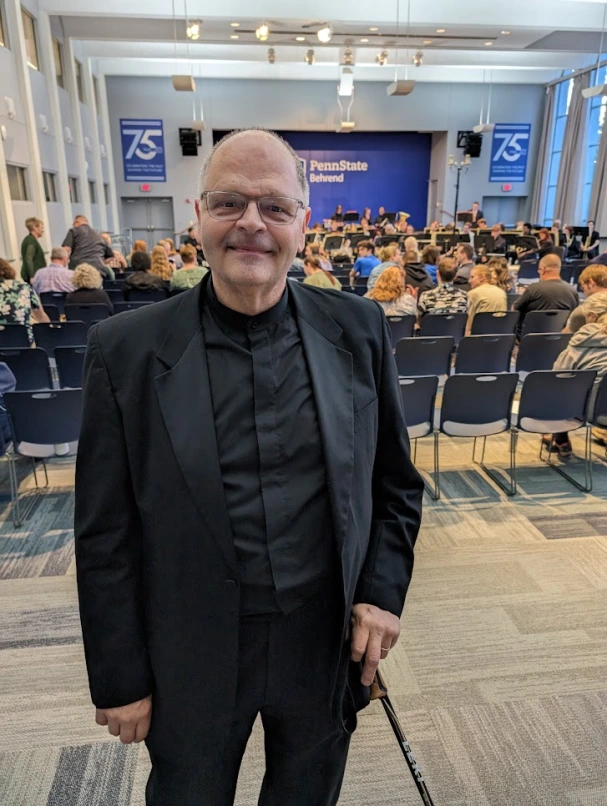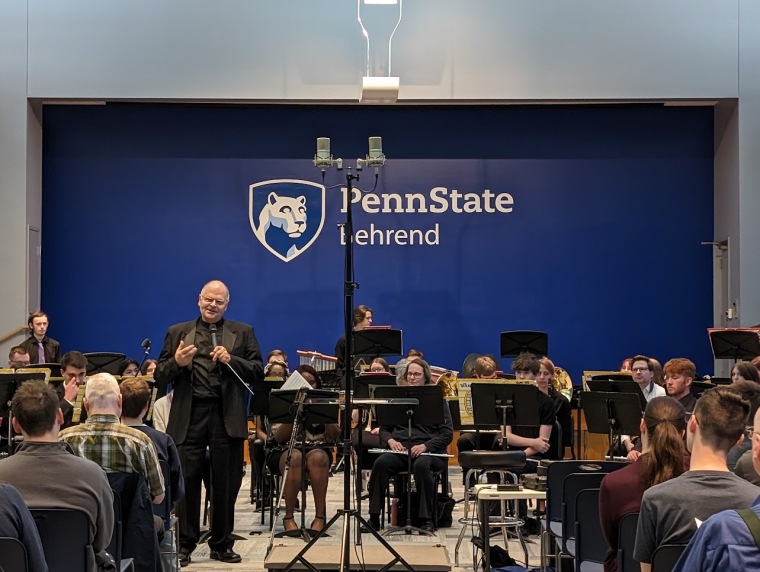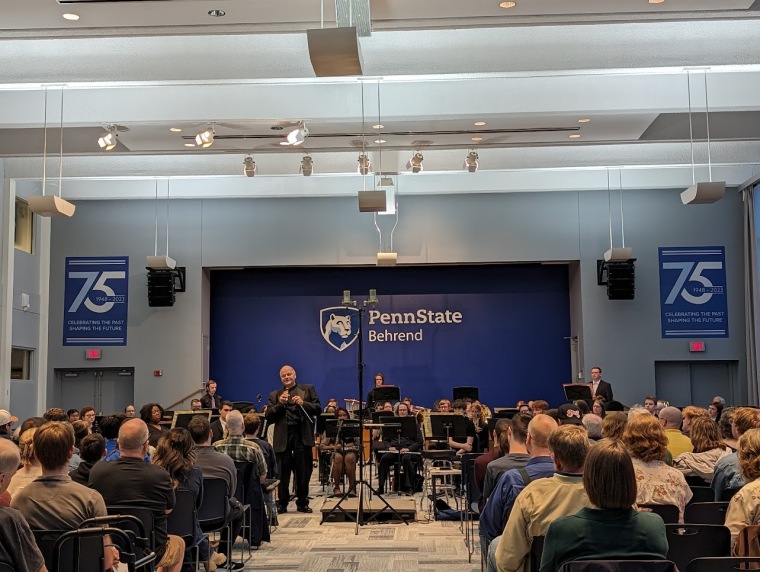By Heather Cass, Publications Manager, Penn State Behrend

Music is as close to time travel as humans can get. Hearing a particular song can transport you to your early childhood dancing in the kitchen with your mom, to your first solo drive after getting your license, to your high school prom, to the day you buried a loved one.
“Music is a visceral thing that can actually cause changes to our body chemistry,” said Dr. Gary Viebranz, professor of music and director of instrumental ensembles, which includes jazz, concert, and pep bands. “It can make us happy or provide an outlet for pain or grief. Some songs are forever burned into our memories. I can remember songs that I played when I was seven years old.”
And, yes, he has been making music since he was a child. Viebranz got his first instrument—a paper-headed drum set—for his fourth birthday. By six years old, he was playing the trumpet.
“It came somewhat naturally to me, and I practiced a lot because I enjoyed it, so work ethic was easy for me to find,” he said.
Fortunately, he had parents who encouraged his musical inclinations as he grew up in Strongsville, Ohio.
He knew early on that he wanted to be a music teacher. For several years after college, he taught music at the high school level in the Cleveland area. A return to graduate school opened his eyes to the possibility of teaching college students.
“Crazy as it can be at times, teaching at the collegiate level is much calmer and more predictable than public high school,” he said.
He joined Behrend in July 1999 and will retire in June, after his twenty-fifth year. We sat down with Viebranz to learn more about music education, his career, and his post-retirement plans.
Can anyone learn to play an instrument?
Yes, but it takes more persistence than some people want to put into it. It’s never too late, though.
How many instruments can you play today, and what is your favorite?
Tuba, baritone, trombone, and bass guitar. Tuba is my first love and my go-to.
Is there an instrument you want to learn in retirement?
There are things I’d like to play around with, like my theremin, which is an electronic instrument that you don’t actually touch, and I’d like to get back to playing bass guitar again.
Not everyone who participates in a band wants to be a musician, so why do you think students make time for it?
The point of music education isn’t to have a career in music. It’s to spawn creative thinking and to make something abstract into something you can hear and feel. Also, it can serve a lot of purposes in a person’s life. It can be a way to escape or grieve or relax or find joy or relieve stress.
What is your most memorable teaching moment?
To be honest, it wasn’t a positive one, but I think it’s worth sharing. In a general education music class, I shared something interesting that was outside the curriculum of the class and said, “That won’t be on the test, though,” and a student asked, “Then why are you wasting our time?” I was shocked by the idea this student had that because something wouldn’t be on the exam, it wasn’t important or worth knowing.
What other changes have you noticed in teaching for twenty-five years?
It’s become harder to find inroads into students’ mindsets, to widen the focus and have them entertain the idea that there is not always a single solution or result, but that there can be many ways to achieve an expected result.
One of your most popular classes was about the Beatles. What did you cover?
We studied everything from pre-Beatles to Beatlemania and on though the group’s breakup. They recorded thirteen commercial albums, which made it easy to set up the course by covering one album each week through the semester.
Music at Noon, which you also directed, is one of the college’s most enduring musical traditions. How did you get involved?
The program had been going on for ten years when I came to Behrend. Several years later, I said I would do it for a year, and here we are. It’s been going strong for thirty-four years. I have been involved for seventeen of them. And, yes, it will continue after me.
Are there any Music at Noon performances that stick out in your memory?
In their own way, they have all been memorable. You have to live each concert in the moment. One of the unique things about the program is that it draws an all-ages audience, from Erie City elementary school children to college students to older community members.
What would people be surprised to find on your Spotify playlist?
Well, you might be surprised to know that I don’t have Spotify. That said, I have eclectic musical tastes. I’m open to listening to anything, and I don’t worry about labels. Of course, I enjoy the music of my youth, things that were popular in the mid- to late-1980s, the most.
What will you miss most about Behrend?
The people: Many students, staff, and faculty members become like family.

VITAL STATS AND PARTING THOUGHTS
Family: Wife, Mari; Daughters, Sofia, 26, and Elizabeth, 23.
First concert: “My older sister took me to see John Denver at the Blossom Music Center in Cuyahoga Falls, Ohio, when I was young.”
Perfect song: “I don’t know that perfection exists because it’s an arbitrary measure. Perfect presents itself in the moment when the right song comes on at the right time.”
A song he will always sing along with: “’Jar of Hearts’ by Christina Perri. I love to blast it in the car and harmonize along.”
Non-music hobbies: “I love to bike, kayak, and travel.”
Retirement plans: “My wife is still working, and she loves her job, so I’ll be in Erie for the foreseeable future. There are some passions I’d like to revive, like singing, bowling, and fishing.”

